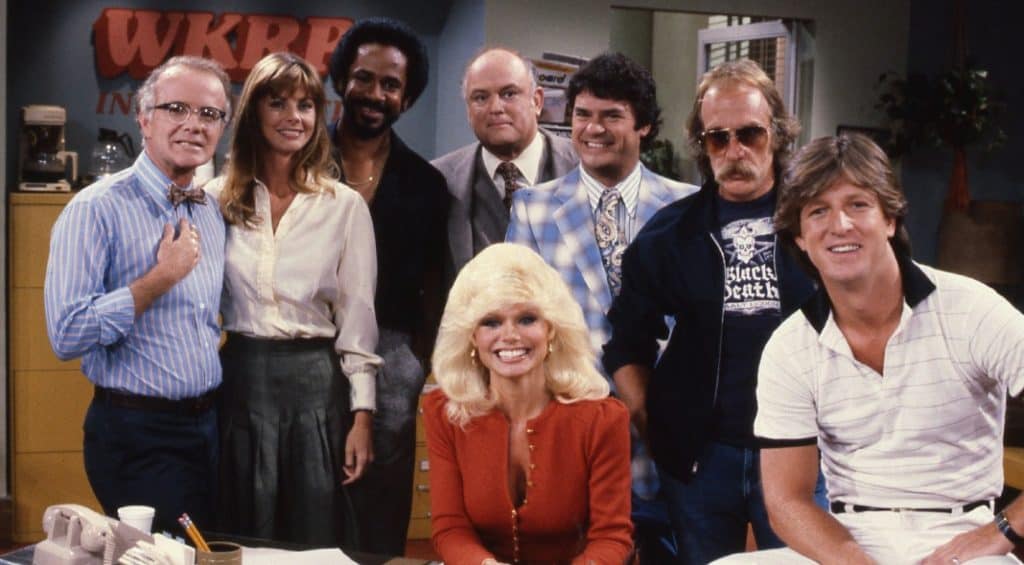 For those of us who grew up addicted to broadcast radio, with its open mics and closed-door politics, “WKRP in Cincinnati” offered both affection and satire. And in that sound booth of a sitcom, no one held the frequency quite like Loni Anderson, who left us this weekend at age 79. As Jennifer Marlowe, the station’s receptionist, gatekeeper, and quiet oracle, Loni brought an impeccable poise to the role, turning what might have been just another dumb blonde into a strategic triumph, a lesson in misdirection, elegance, and the sly power of feminine competence.
For those of us who grew up addicted to broadcast radio, with its open mics and closed-door politics, “WKRP in Cincinnati” offered both affection and satire. And in that sound booth of a sitcom, no one held the frequency quite like Loni Anderson, who left us this weekend at age 79. As Jennifer Marlowe, the station’s receptionist, gatekeeper, and quiet oracle, Loni brought an impeccable poise to the role, turning what might have been just another dumb blonde into a strategic triumph, a lesson in misdirection, elegance, and the sly power of feminine competence.
Born in Saint Paul, Minnesota, in 1945, Loni Kaye Anderson’s rise was not meteoric but calculated, the result of careful self-shaping, and a determination to redefine the narrow lens through which American audiences viewed beauty. When “WKRP” debuted in 1978, it was Anderson’s turn not only to perform but to reimagine what it meant to be a woman in the workplace—on screen, yes, but also behind the scenes.
Jennifer Marlowe was a triumph of composure amid absurdity. In a workplace full of buffoons and blowhards, Anderson’s character was a fixed star—cool, efficient, unflappable. She didn’t chase the spotlight; it adjusted itself around her. She may have been written as set dressing, but she directed the room, calibrated the tone, and ran the station with the arch of an eyebrow. Her performance was a study in balance, glamour with wit, strength in stillness. It was a new archetype for a new age: the receptionist as CEO-in-waiting.
Her impact went beyond the laugh track. In 1980, Anderson renegotiated her salary, publicly and unapologetically, a quiet but seismic assertion of professional value. In an industry where women were often ornamental, she refused to be background.
Her off-screen life, of course, played out in full view of the tabloids, particularly her high-profile marriage to Burt Reynolds. Their romance was box-office gossip, punctuated by “Stroker Ace,” a cinematic misfire that could have tanked lesser stars. But Anderson emerged, as ever, with a sense of timing—comic and otherwise. When the marriage ended in 1994, she handled the divorce with a kind of practiced grace, turning personal upheaval into another moment of public poise.
Later in life, Anderson shifted focus. She embraced family and advocacy, trading scripts for causes. But her legacy was already inked into the cultural DNA. Jennifer Marlowe, with her icy-cool detachment and quiet command, had helped rewrite the sitcom woman, less sidekick, more anchor.
Loni Anderson made it look easy, which of course meant it wasn’t. She moved through the business with a rare blend of self-awareness and sparkle, a performer who understood the machinery of the image and knew how to quietly steer it. Her blonde hair became a Trojan horse for the kind of wisdom that doesn’t announce itself, but leaves a mark.
In an industry still prone to confusing sparkle for substance, Loni Anderson was a reminder that the two could, in the right hands, be the same thing. Her presence never needed to shout. It simply adjusted the orbit of the room.

